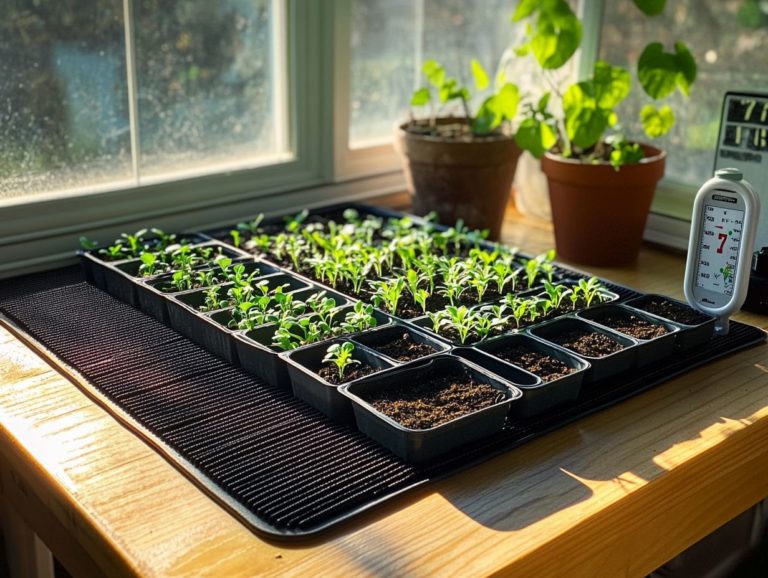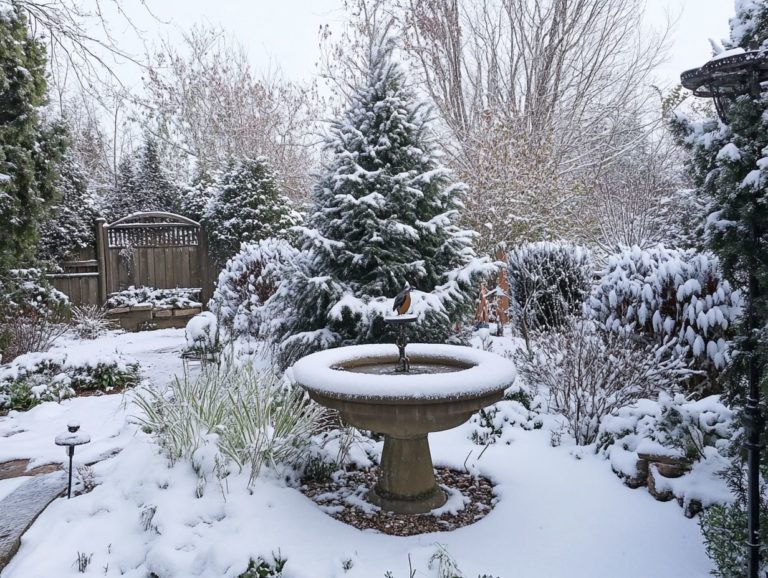Using Natural Fertilizers in Winter
Fertilizing in winter might feel a bit counterintuitive, but it s essential for nurturing healthy soil and vibrant plants, especially when preparing your garden for the upcoming seasons!
This article delves into the significance of winter fertilization, focusing on winter fertilizers that benefit plant growth. We ll highlight both organic and synthetic options while discussing the many benefits of natural fertilizers and their positive effects on the environment and human health.
You ll discover how to choose the right fertilizer for winter, use effective application techniques, and implement best practices to achieve optimal results even in the colder months. Get ready to transform your winter gardening routine!
Contents
- Key Takeaways:
- Benefits of Natural Fertilizers
- How to Choose the Right Fertilizer for Winter
- Application Techniques for Winter Fertilizing
- Best Practices for Winter Fertilizing
- Frequently Asked Questions
- Why should I use natural fertilizers in winter?
- What types of natural fertilizers are best for winter use?
- How often should I apply natural fertilizers during winter?
- Can I make my own natural fertilizer for winter use?
- Are there any precautions I should take when using natural fertilizers in winter?
- Can I use natural fertilizers in winter for all types of plants?
Key Takeaways:
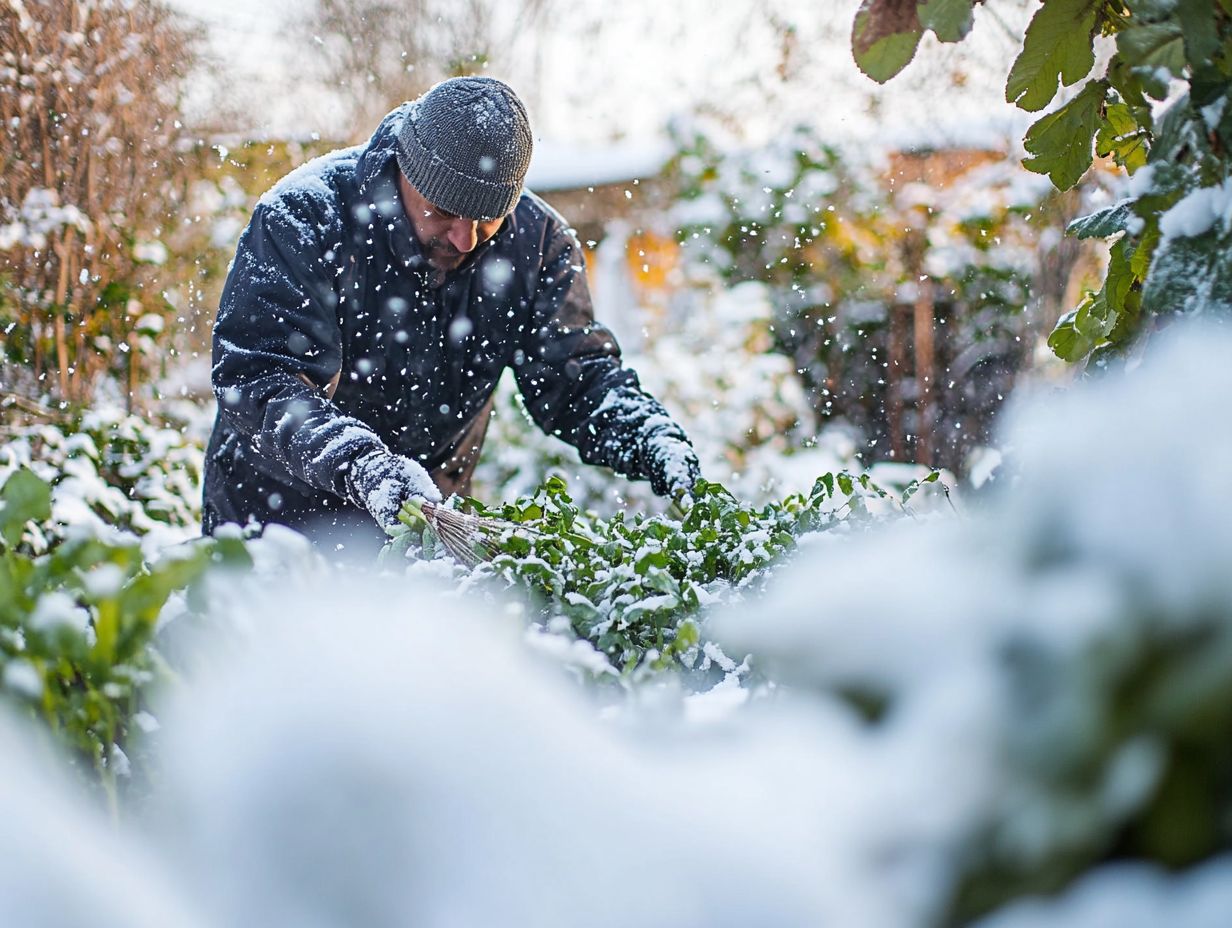
- Using natural fertilizers in winter provides environmental and health benefits compared to synthetic fertilizers.
- When choosing a natural fertilizer, consider the nutrient content and release rate.
- To apply natural fertilizers effectively and safely, including compost tea, avoid excessive use and apply before snowfall.
Why Fertilizing in Winter is Important
Fertilizing in winter is essential for maintaining the health and vitality of your lawn, trees, and shrubs during the colder months. While many plants may seem to be dormant, this period presents a prime opportunity to increase the nutrients in the soil.
By fertilizing, you ensure that the root systems have the vital nutrients they need for optimal growth as they prepare for the vibrant spring season ahead.
Choosing the right winter fertilizer can significantly influence plant growth and root development, ensuring you re set for a flourishing planting schedule come spring!
Incorporating key nutrients like nitrogen and potassium during winter strengthens your plants’ resilience against harsh cold weather and encourages deeper root growth essential for establishing a strong foundation when warmer weather arrives.
To tailor your approach, consider checking your soil to see what nutrients it needs. This insight allows you to select the perfect fertilizer blend, addressing any deficiencies in your plants.
This thoughtful strategy for winter fertilization supports long-term health and enhances your lawn’s ability to thrive in the heat of summer, leading to a lush and vibrant landscape that will be the envy of your neighborhood!
Types of Natural Fertilizers
Natural fertilizers are essential for enhancing your sustainable gardening and lawn care practices. You have various options, including organic fertilizers, synthetic fertilizers, and slow-release fertilizers.
Each type has unique benefits and applications tailored to your turfgrass and soil conditions, which are key for managing different grass types effectively. It’s also important to consider the environmental impact of your fertilizer choices to ensure your gardening efforts are both effective and eco-friendly.
Start your winter fertilization journey today for a lush garden come spring!
Organic vs. Synthetic Fertilizers
When considering whether to use organic fertilizers or synthetic fertilizers, it’s important to grasp their unique characteristics, benefits, and environmental implications. Organic fertilizers, sourced from natural materials, enrich your soil with essential nutrients while enhancing the activity of tiny organisms in the soil that help plants grow.
In contrast, synthetic fertilizers deliver a quick supply of nutrients, often packed with high levels of nitrogen. However, they come with potential drawbacks for the long-term health of your soil.
Each option presents its own set of advantages and challenges that can significantly shape your gardening practices and overall ecological footprint. If you choose organic fertilizers, such as compost, you re likely to see improved soil structure and health as beneficial microbes flourish, creating a sustainable environment. On the flip side, while synthetic fertilizers can speed up plant growth, they run the risk of degrading soil quality over time and increasing water pollution due to runoff.
Understanding how each type influences nutrient availability, plant resilience, and ecological balance is essential for making informed decisions that not only enhance your garden but also promote environmental stewardship in your winter gardening practices.
Benefits of Natural Fertilizers
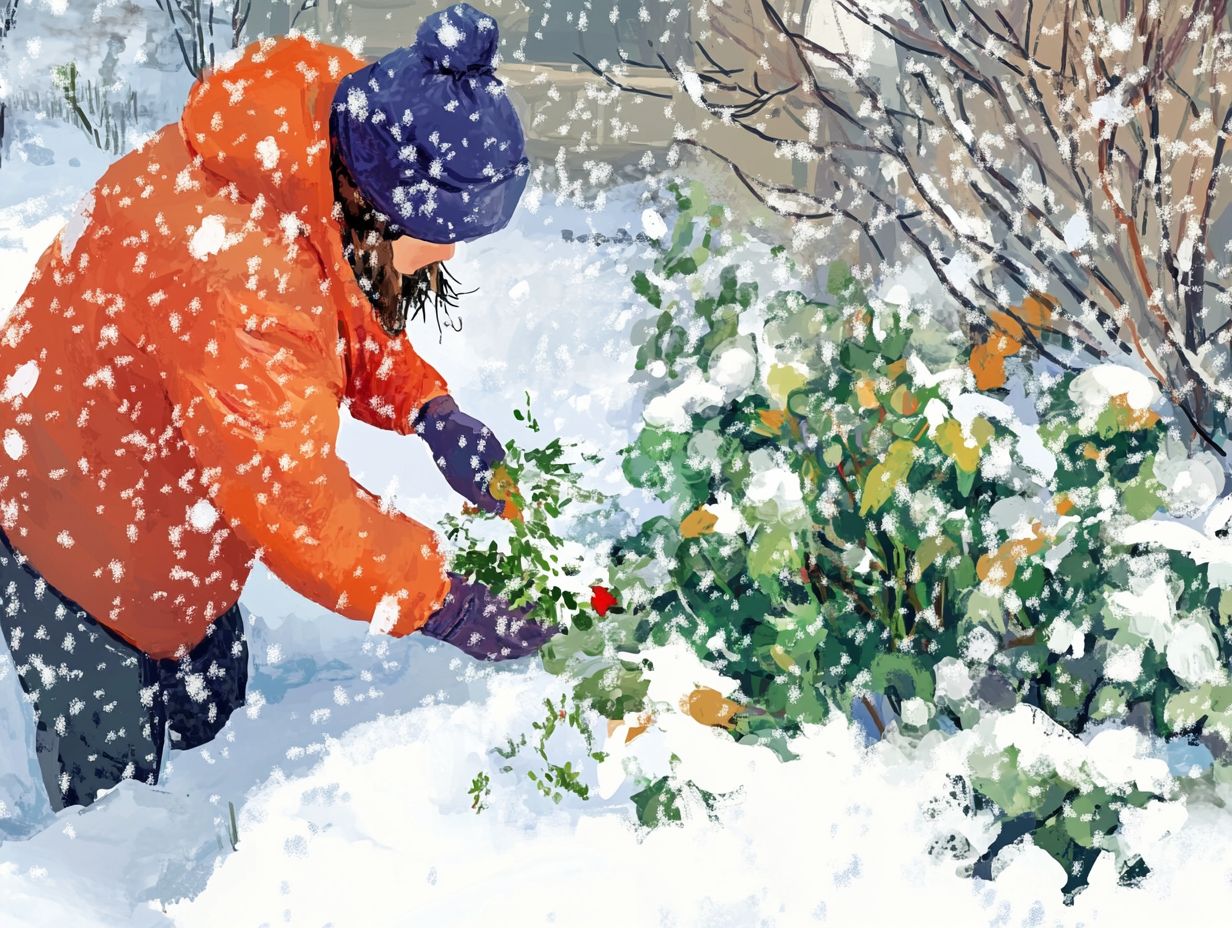
Natural fertilizers present a wealth of benefits that go well beyond merely fostering plant growth; they significantly enhance both environmental health and human well-being.
By opting for these natural solutions, including compost tea, you can improve soil quality, encourage biodiversity, and engage in sustainable gardening practices that nurture thriving ecosystems.
Environmental and Health Benefits
The environmental and health benefits of using natural fertilizers are truly remarkable, as they play a crucial role in nurturing healthier soil ecosystems while minimizing reliance on harmful chemicals in your gardening practices. By choosing natural fertilizers, you not only nourish your plants but also embrace a sustainable approach that protects both your environment and your well-being.
Natural fertilizers, such as compost, manure, and compost tea, replenish essential nutrients, enhancing soil structure and fostering biodiversity within microbial communities. This approach supports vibrant plant growth and curtails the runoff of synthetic fertilizers, which often leads to water pollution and the degradation of aquatic ecosystems.
Using these eco-friendly alternatives enhances the nutritional value of your crops, promoting human health through fresher, pesticide-free produce. For wildlife, these practices create safer habitats, reducing exposure to harmful chemicals and encouraging a balanced ecosystem, ultimately contributing to a more resilient environment.
How to Choose the Right Fertilizer for Winter
Selecting the right winter fertilizer is key to keeping your plants healthy! Pay close attention to several factors, including soil conditions, nutrient availability, and the specific needs of various grass types.
Performing a soil test is essential; it reveals the current nitrogen levels and nutrient composition, giving you the power to make informed decisions that cater to the unique requirements of your lawn and garden.
Factors to Consider
When selecting a fertilizer for winter application, it s essential to consider factors such as soil test results, nutrient levels, and the specific grass types in your lawn. Understanding these elements ensures that the fertilizer you choose effectively supports plant growth and strengthens root systems during the cold months.
Conducting soil tests offers invaluable insights into the pH and nutrient deficiencies in your soil, guiding you to select a fertilizer that meets those specific needs. Different grass types, like Kentucky bluegrass or tall fescue, respond differently to winter fertilization. Some may thrive on a higher nitrogen content to fortify their roots, while others might need a more balanced nutrient profile for overall health.
Timing is also crucial; applying the correct winter fertilizer before the ground freezes can enhance resilience against harsh winter conditions. This tailored approach maximizes nutrient uptake and ensures your lawn not only survives but flourishes come spring!
Don t wait! Choose the right fertilizer today to boost your garden s health!
Application Techniques for Winter Fertilizing
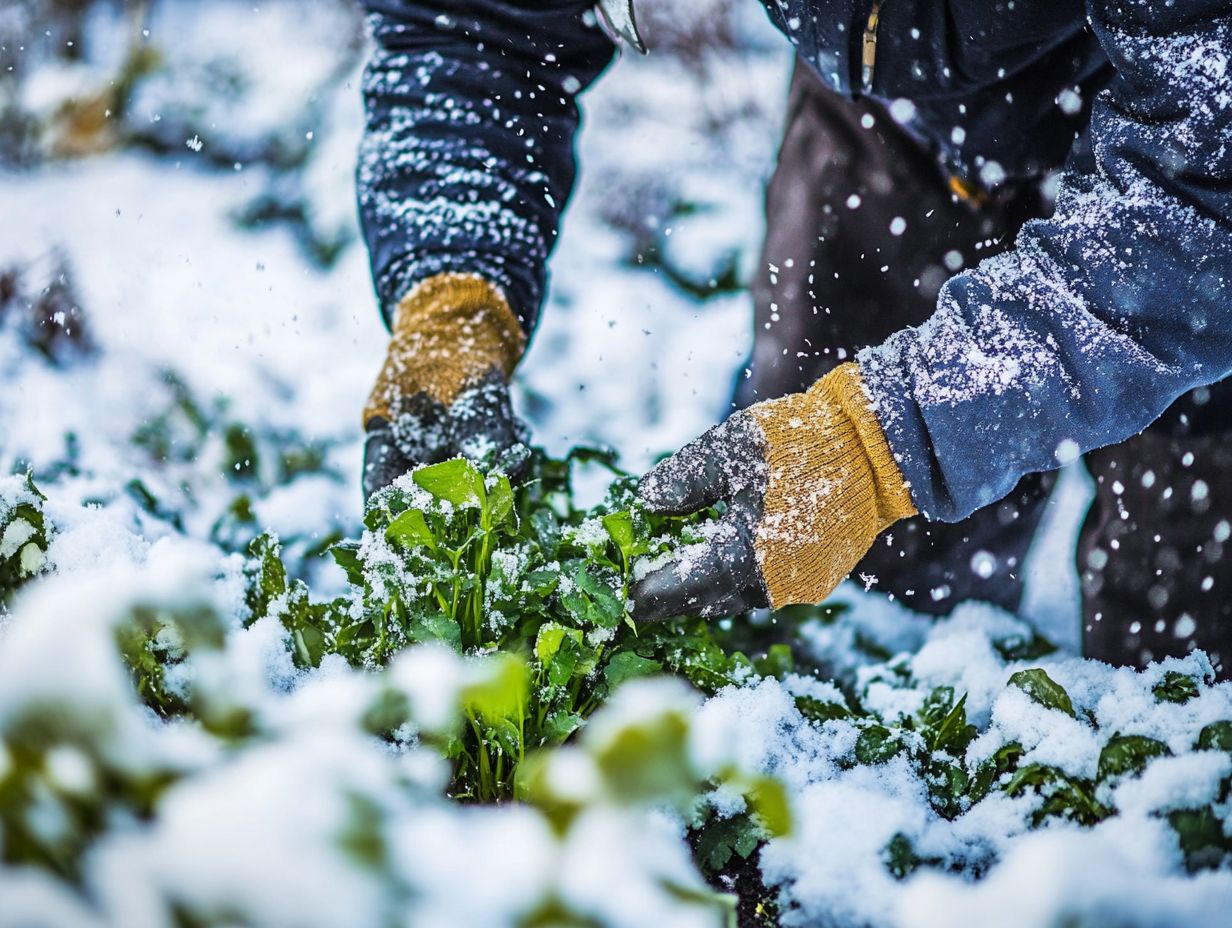
Mastering effective application techniques for winter fertilizing is essential for helping plants get nutrients and ensuring the health of your plants during the colder months. By embracing the right methods for fertilizer application, you can significantly enhance nutrient availability in the soil. This effectively supports root growth and primes your plants for a vibrant spring season.
Tips for Effective and Safe Application
To ensure you apply winter fertilizers effectively and safely, adhere to specific guidelines. These guidelines enhance nutrient efficiency while protecting the environment, especially for wildlife.
Timing is everything applying fertilizers just before anticipated rainfall can boost absorption while minimizing runoff, which is when water washes away fertilizers into nearby waterways. You ll want to grasp the appropriate application rates, as over-fertilizing can lead to nutrient leaching and excessive growth that could compromise plant health.
Opting for a slow-release formula is wise for winter fertilizing, as it gradually provides nutrients. This reduces the risk of spikes that can stress your turf. Using organic or eco-friendly options significantly reduces negative impacts on surrounding wildlife and water quality, fostering a healthier landscape overall.
Best Practices for Winter Fertilizing
Implementing best practices for winter fertilizing is essential for achieving optimal results and nurturing healthy lawns and gardens. This includes proper lawn care strategies during winter dormancy. Pay close attention to timing, select the right fertilizers, and understand the specific needs of your grass types.
By doing so, you ensure effective nutrient application and promote robust plant growth, even in winter’s chill. This allows for a successful planting schedule when spring arrives.
Dos and Don’ts for Optimal Results
To achieve optimal results in winter fertilizing, adhering to a clear set of dos and don’ts can dramatically enhance how your plants respond to nutrient applications. These guidelines encompass effective strategies for nutrient management, application techniques, and overall lawn care practices.
When approaching winter fertilizing, it’s essential to recognize that proper timing and selecting the right fertilizers are crucial for nurturing your lawn’s roots. For instance, using slow-release fertilizers allows for a steady supply of nutrients without shocking your plants. On the other hand, steer clear of high-nitrogen fertilizers during the colder months, as they promote top growth rather than encouraging deep root development.
Keeping a vigilant eye on soil temperatures ensures that nutrients are absorbed efficiently. Following these practices supports your lawn’s resilience against winter stressors. Ultimately, this paves the way for a lush and vibrant landscape when spring arrives.
Frequently Asked Questions

Why should I use natural fertilizers in winter?
Natural fertilizers improve soil health and help plants grow. They release nutrients slowly and protect groundwater.
What types of natural fertilizers are best for winter use?
Compost, bone meal, blood meal, and seaweed are great natural fertilizers for winter use. To enhance your gardening efforts, consider utilizing vertical gardening in winter. These fertilizers are rich in nutrients and have a slow-release rate, ensuring that your plants receive a steady supply of nourishment throughout the cold season.
How often should I apply natural fertilizers during winter?
It is recommended to apply natural fertilizers once every 4-6 weeks during winter. This will provide your plants with a consistent supply of nutrients without over-fertilizing, which can harm plant roots in the cold weather.
Can I make my own natural fertilizer for winter use?
Yes, you can make a natural fertilizer for winter. Compost kitchen scraps and yard waste.
This process provides your plants with nutrients, reduces waste, and improves soil health.
Are there any precautions I should take when using natural fertilizers in winter?
When using natural fertilizers in winter, avoid putting them too near plant stems. This can cause damage.
Wear gloves when handling fertilizers. Also, avoid inhaling dust or particles.
Can I use natural fertilizers in winter for all types of plants?
Natural fertilizers benefit most plants in winter. Research and choose the right type for your plants.
The right fertilizer can make a big difference!





